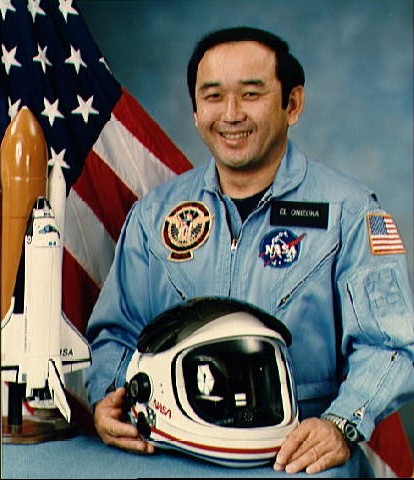 ELLISON
S. ONIZUKA ELLISON
S. ONIZUKA
(Lieutenant Colonel, USAF) NASA Astronaut PERSONAL DATA: Born June 24, 1946, in Kealakekua, Kona, Hawaii. Died January 28, 1986. He is survived by his wife, Lorna, and two daughters. He enjoyed running, hunting, fishing, and indoor/outdoor sports. EDUCATION: Graduated from Konawaena High School, Kealakekua, Hawaii, in 1964; received bachelor and master of science degrees in Aerospace Engineering in June and December 1969, respectively, from the University of Colorado. ORGANIZATIONS: Member of the Society of Flight Test Engineers, the Air Force Association, the American Institute of Aeronautics and Astronautics, Tau Beta Pi, Sigma Tau, and the Triangle Fraternity. SPECIAL HONORS: Presented the Air Force Commendation Medal, Air Force Meritorious Service Medal, Air Force Outstanding Unit Award, Air Force Organizational Excellence Award, and National Defense Service Medal. EXPERIENCE: Onizuka entered on active duty with the United States Air Force in January 1970 after receiving his commission at the University of Colorado through the 4-year ROTC program as a distinguished military graduate. As an aerospace flight test engineer with the Sacramento Air Logistics Center at McClellan Air Force Base, California, he participated in flight test programs and systems safety engineering for the F-84, F-100, F-105, F-111, EC-121T, T-33, T-39, T-28, and A-1 aircraft. He attended the USAF Test Pilot School from August 1974 to July 1975, receiving formal academic and flying instruction in performance, stability and control, and systems flight testing of aircraft. In July 1975, he was assigned to the Air Force Flight Test Center at Edwards Air Force Base, California, serving on the USAF Test Pilot School staff initially as squadron flight test engineer and later as chief of the engineering support section in the training resources branch. His duties involved instruction of USAF Test Pilot School curriculum courses and management of all flight test modifications to general support fleet aircraft (A-7, A-37, T-38, F-4, T-33, and NKC-135) used by the test pilot school and the flight test center. He logged more than 1,700 hours flying time. NASA EXPERIENCE: Selected as an astronaut candidate by NASA in January 1978, he completed a 1-year training and evaluation period in August 1979. He subsequently worked on orbiter test and checkout teams and launch support crews at the Kennedy Space Center for STS-1 and STS-2. He worked on software test and checkout crew at the Shuttle Avionics and Integration Laboratory (SAIL), and has supported numerous other technical assignments ranging from astronaut crew equipment/orbiter crew compartment coordinator to systems and payload development. He first flew as a mission specialist on STS 51-C, the first Space Shuttle Department of Defense mission, which launched from Kennedy Space Center, Florida on January 24, 1985. He was accompanied by Captain Thomas K. Mattingly (spacecraft commander), Colonel Loren J. Shriver (pilot), fellow mission specialist, Colonel James F. Buchli, and Lieutenant Colonel Gary E. Payton (DOD payload specialist). During the mission Onizuka was responsible for the primary payload activities, which included the deployment of a modified Inertial Upper Stage (IUS). STS 51-C Discovery completed 48 orbits of the Earth before landing at Kennedy Space Center, Florida, on January 27, 1985. With the completion of this flight he logged a total of 74 hours in space. Lieutenant Colonel Onizuka was a mission
specialist on STS 51-L which was launched from the Kennedy Space Center,
Florida, at 11:38:00 EST on January 28, 1986. The crew on board the Orbiter
Challenger included the spacecraft commander, Mr. F.R. Scobee, the pilot,
Commander M.J. Smith (USN), fellow mission specialists, Dr. R.E. McNair,
and Dr. J.A. Resnik, as well as two civilian payload specialists, Mr. G.B.
Jarvis and Mrs. S. C. McAuliffe. The STS 51-L crew died on January 28,
1986 when Challenger exploded 1 min. 13 sec. after launch.
(reprinted from NASA Astronaut Biographies) |
